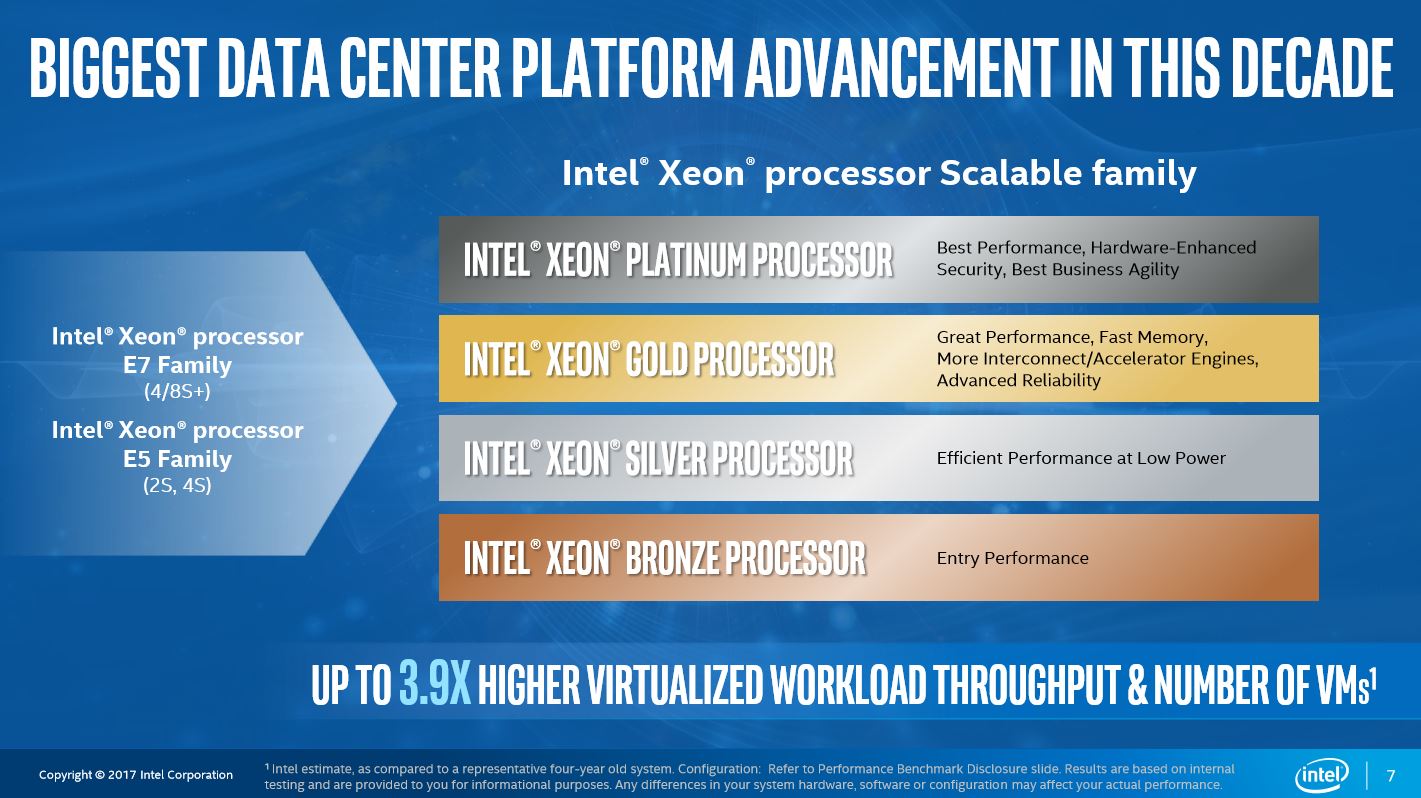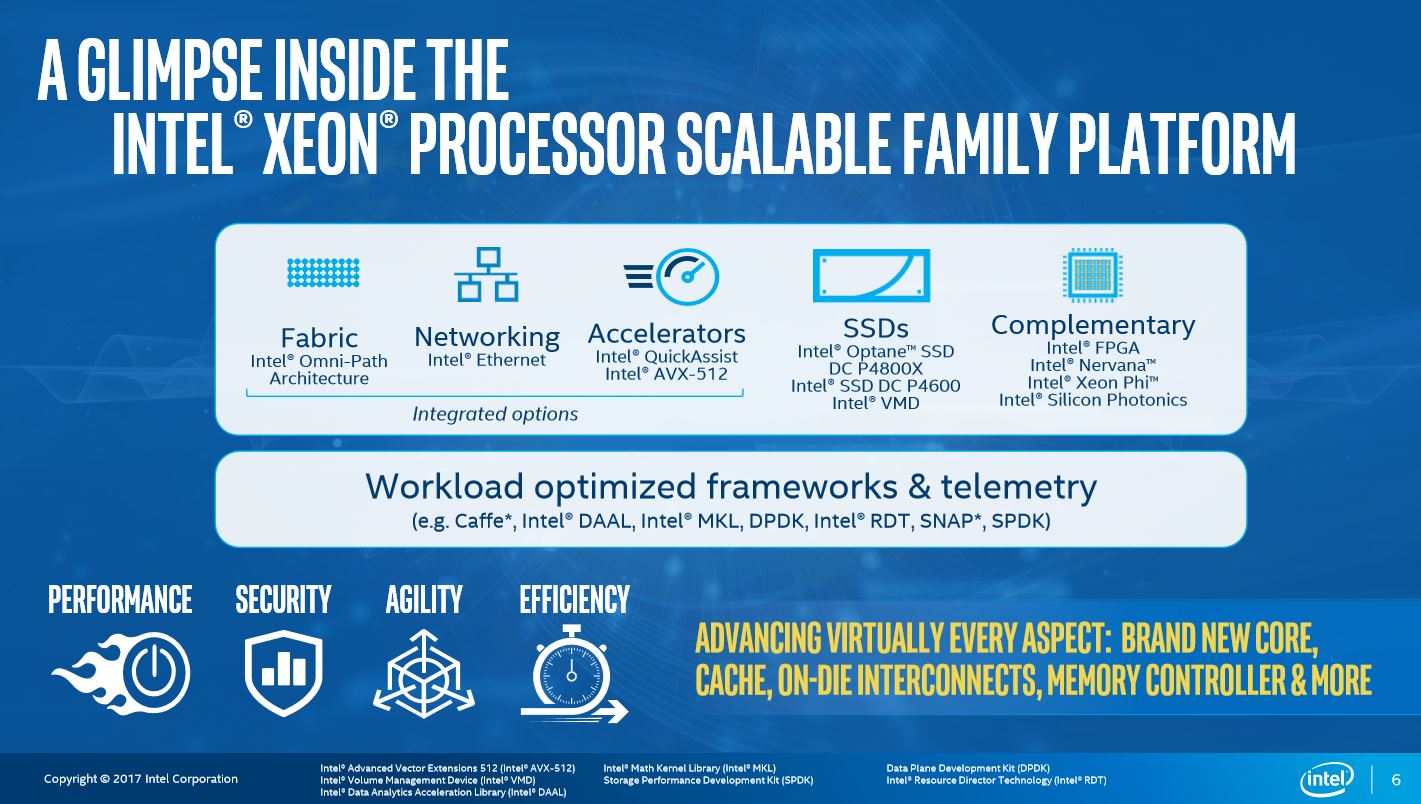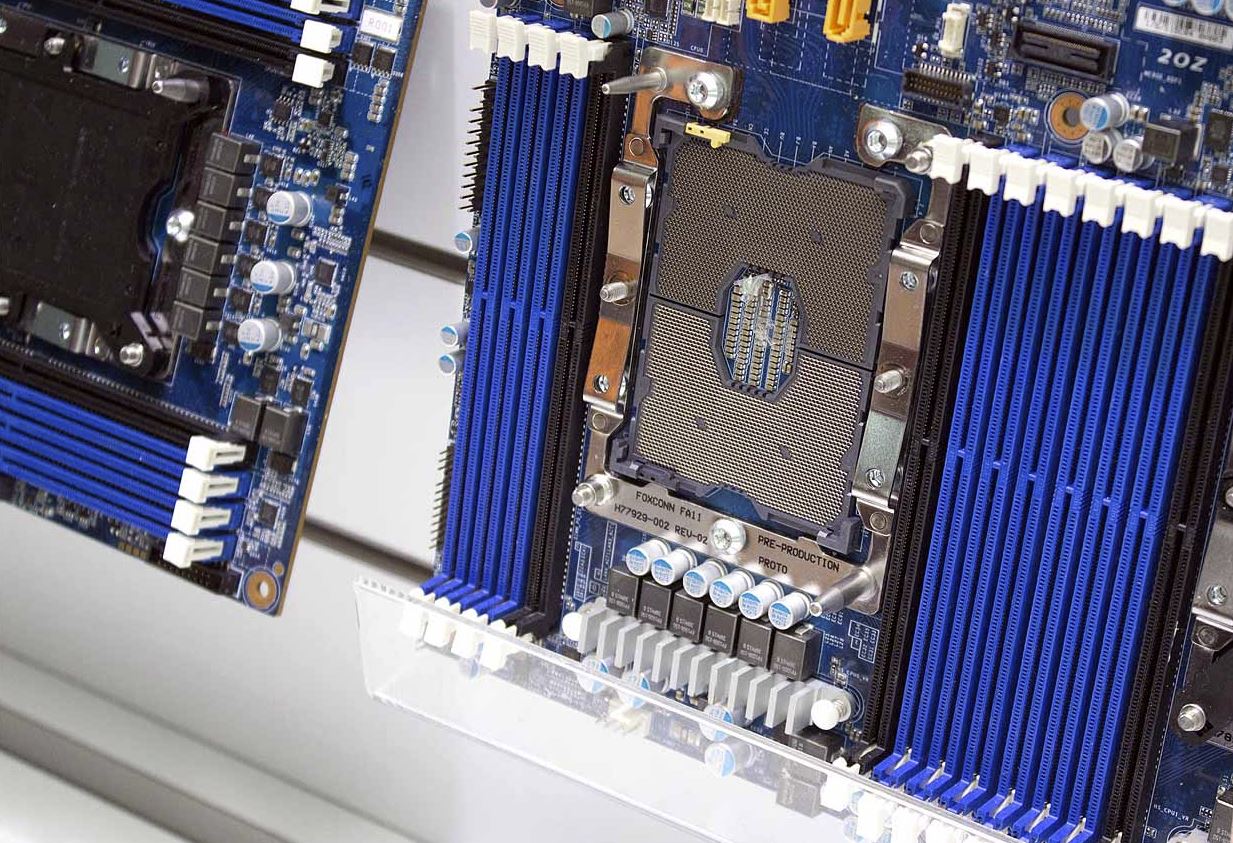Intel Announces Scalable Platform Family, Skylake Xeons Imminent
Intel is reorganizing its enterprise CPU branding from the traditional Xeon E5 and E7 SKUs into a new Xeon Processor Scalable family that is stratified into Platinum, Gold, Silver, and Bronze tiers. The transition comes prior to Intel's looming release of the new Skylake-SP lineup (another change from the previous -EP branding).
Lisa Spelman, Intel's vice president and general manager of Xeon products, penned an editorial outlining a few features of the new servers, which promise to offer up to 3.9x more virtualization workload scalability compared to four-year-old server platforms. Spelman also mentioned a new Volume Management Device (VMD), which Intel designed to improve management of the company's latest SSDs, such as the 3D XPoint-powered Intel DC P4800X we recently tested and the recently-announced DC P4600 series. It also allows for hot-plugging.
Intel's E7 family (four- to eight-socket) now falls into the Gold category, while the E5 family (two- to four-socket) slots into the Silver category. Intel will add as-yet undefined products into the upper and lower tiers in the future. Intel didn't release specifications for the new Skylake-SP models but listed integrated QuickAssist (QAT) AVX-512 accelerators, new on-die interconnects, and memory controller as key features. Intel also lists FPGAs, Nervana (ASICs), Xeon Phi, and silicon photonics as complimentary platform features.
Hot-plugging 2.5" NVMe SSDs isn't a new feature, so it will be interesting to see Intel's spin on the new management device. We do know that the latest Intel data center SSDs have improved NVMe-MI management features, as well as out-of-band management capabilities, which is integral for simplified management of large SSD deployments.
At Computex 2016 we spotted the massive LGA3647 socket that Intel employs for the Purley (aka Skylake) Xeons. Intel also employs the same socket for its Knights Landing products. The extra pin allotment supports a hefty allotment of new features, such as 100Gbps Omni-Path networking connectivity. Intel has also demonstrated on-die FPGAs in the past, which might work its way into the platform as well.
Spelman noted that the company is launching the Xeon Processor Scalable family this summer, so we expect more details soon.
Get Tom's Hardware's best news and in-depth reviews, straight to your inbox.

Paul Alcorn is the Editor-in-Chief for Tom's Hardware US. He also writes news and reviews on CPUs, storage, and enterprise hardware.
-
bit_user This whole precious metals naming scheme is going to backfire on them. I can just see it: IT department files a purchase order for Platinum Xeon processors and it gets shot down because some MBA decides they should be able to make do with Silver.Reply
Back when processor families were just E3/E5/E7, the same people would just silently nod and approve the order, for fear of speaking up and exposing their ignorance. But everybody thinks they know something about precious metals. Especially the finance folks.
This was a huge marketing fail. Intel should've used the Platinum/Gold/Silver/Bronze naming for consumer products, where some people are ignorant enough to fall for it. In the enterprise IT sector, where products are chosen based purely on specs and price, this isn't going to upsell anyone. -
Vosgy "The extra pin allotment supports new a hefty allotment of new features,"Reply
In the second last Paragraph, needs some correcting :D -
WildCard999 I just want them to work on budget boards like they used to (Haswell). The Xeon 1231 V3 was great paired with a 1150 socket MB and good GPU.Reply -
Paul Alcorn Reply19648709 said:"The extra pin allotment supports new a hefty allotment of new features,"
In the second last Paragraph, needs some correcting :D
Fixed, thanks! :D
-
jimmysmitty Reply19648413 said:And yet it still won't be as good as Naples...
Based on what? There is very little information out there but Skylake-EP, which is that this socket is designed for, is going to have up to 32 cores and 64 threads as well. No solid info but I am seeing 6 memory channels which will be a slight disadvantage to AMDs 8 but TBH AMD hasn't had a competitive HPC processor for a very long time. People think Intels market share on the consumer end is high, in the server market it is almost every last server. -
jimmysmitty Reply19648413 said:And yet it still won't be as good as Naples...
Based on what? There is very little information out there but Skylake-EP, which is that this socket is designed for, is going to have up to 32 cores and 64 threads as well. No solid info but I am seeing 6 memory channels which will be a slight disadvantage to AMDs 8 but TBH AMD hasn't had a competitive HPC processor for a very long time. People think Intels market share on the consumer end is high, in the server market it is almost every last server.


